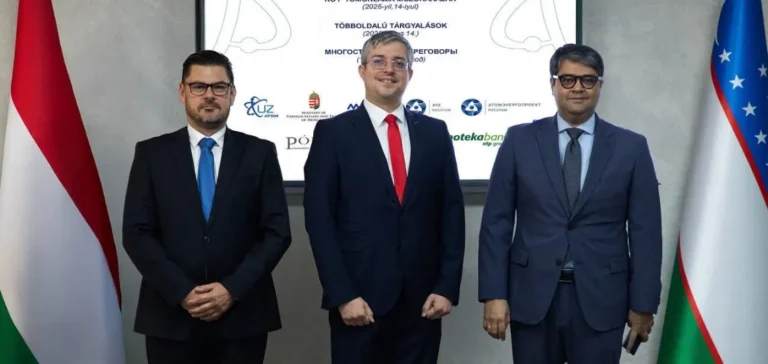The Atomic Energy Agency of Uzbekistan, Uzatom, has formalised a protocol with the Hungarian Ministry of Foreign Affairs and Trade and MVM EGI, concerning cooperation around future national nuclear projects. According to the Uzbek agency, this protocol foresees the introduction of mechanically driven dry cooling systems for nuclear facilities, the preparation of technical and commercial proposals, and the creation of a joint venture for large-scale assembly of these systems in Uzbekistan.
Strengthened nuclear cooperation
This new agreement builds on the memorandum of understanding signed in May between MVM EGI and Uzatom, focused on the deployment of dry cooling technology developed by the Hungarian company. MVM EGI, a subsidiary of the MVM Group since 2020, benefits from decades of experience in this sector. Its site in Bilibino, Russia, remains the only global reference for the application of dry cooling at a nuclear power plant, operational since 1972.
The agreement also mentions the establishment of educational programmes and internships led by Hungary. The creation of a joint venture based in a special economic zone within the country aims to strengthen industrial localisation. According to Uzatom, this initiative will increase the share of local production and support regional industrial development.
Deployment of new capacity and regional partnerships
Discussions held in Tashkent this week involved representatives from Atomstroyexport Joint Stock Company and Atomenergoproyekt Joint Stock Company, subsidiaries of the Russian group Rosatom. Uzbekistan is also preparing for the construction of a small modular reactor plant in the Jizzah region, to be equipped with six RITM-200N units of 55 megawatts electric provided by Rosatom.
Another agreement, signed in June, includes a feasibility study for a high-capacity nuclear plant with two to four VVER-1000 units. The Uzbek strategy relies on diversifying partners and technologies, with a particular focus on localising production and regional industrial integration.
The stakeholders stated that consolidating a multilateral partnership based on transparency and mutual benefit is a key element for the success of one of the largest energy projects in Central Asia. Negotiations on the operational implementation of these agreements are ongoing.






















